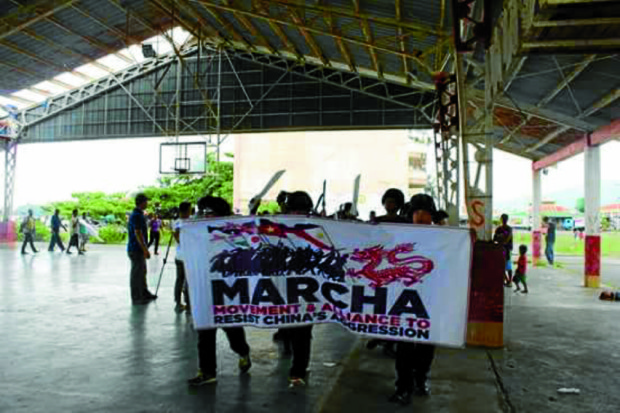
LEAVE PANATAG Zambales fishermen and members of private groups stage a rally in Masinloc on Wednesday, demanding China leave Panatag Shoal. Also known as Scarborough Shoal, Panatag Shoal is a traditional fishing ground for Filipino
fishermen located 230 kilometers off the coast of Zambales, well within the Philippines’ 370-km exclusive economic
zone. CONTRIBUTED PHOTO
SUBIC, Zambales—Carrying Philippine flags and placards that denounced China’s occupation of Panatag Shoal, some 100 fishermen staged a rally in Masinloc town on Wednesday in anticipation of a UN-backed international tribunal’s ruling on the Philippines’ territorial dispute with China in the West Philippine Sea.
The fishermen, who came from coastal towns in Zambales, called on Chinese coast guards to leave Panatag Shoal, a traditional fishing ground for Filipinos located 230 kilometers off the coast of Zambales province.
The shoal is well within the Philippines’ 370-km exclusive economic zone (EEZ), part of the South China Sea that Manila calls West Philippine Sea.
“This [assembly intends] to show our opposition to what China is doing. They have been driving away our fishermen from our territorial waters,” said lawyer Aleta Tolentino, one of the organizers of People Power Volunteers for Reform (PPVR).
PPVR, National Youth Movement for the West Philippines Sea and other private groups organized the rally to denounce China’s seizure and occupation of Philippine-claimed reefs in the West Philippine Sea, including Panatag Shoal.
China seized Panatag, internationally known as Scarborough Shoal, in 2012 after a two-month standoff with the Philippine Navy and the Philippine Coast Guard to add it to a string of reefs that it had grabbed and started to develop into artificial islands to assert its claims to almost all of the South China Sea.
The loss of Panatag forced the Philippines, which has no military muscle to defend its territory, to bring a law of the sea suit against China in the United Nations Permanent Court of Arbitration in The Hague in 2013.
In the suit invoking the United Nations Convention on the Law of the Sea (Unclos), the Philippines asked the tribunal to invalidate China’s so-called nine-dash-line claim that covered 90 percent of the South China Sea and demanded respect for its right to exploit resources within its EEZ, which is recognized under Unclos.
The Philippine action angered China, which refused to take part in the arbitration and said it would not abide by any ruling of the tribunal.
It has since blockaded Panatag Shoal, stationing coast guards in the area to chase away Filipino fishermen from the reef, which the United States believes China plans to develop into another artificial island as part of its push for militarization of the South China Sea.
The United States has warned China that the plan would be seen as a “provocative action” and urged Beijing to abide by the ruling of the UN tribunal.
The ruling is expected to come within weeks, and the consensus among officials and analysts in Asia and countries outside the region is that the decision will go largely against China.
Even China expects the tribunal to rule against it, and it has been gathering allies, including faraway and landlocked countries in Asia and Africa, to support its stand that it has sovereignty over nearly all of the South China Sea.
Harassment of fishermen
Although a signatory to Unclos, China denies the Philippines rights to Panatag Shoal, also known locally as Bajo de Masinloc, and aggressively prevents Filipino fishermen from approaching the reef’s lagoon.
One incident reported here by fishermen involved Chinese Coast Guard vessels ramming Filipino fishing boats.
“Our fishermen are fighting for their right to livelihood. We are supporting them because part of our engagement is to give them assistance,” Tolentino told the Inquirer by phone.
Although the fishermen are hopeful that the arbitration tribunal will rule in favor the Philippines, they remain apprehensive about possible retaliation from China, she said.
“Even if we win [the arbitration case against China], they (Chinese coast guards) may become more aggressive after the ruling,” she said.
Norma Amata, a PPVR organizer in Zambales, said the rally showed the Filipino fishermen were united in their stand for territorial rights.
She said the rally was not intended to provoke China.
“We all know that Bajo de Masinloc belongs to the Filipinos. We staged this peaceful rally to ask the Chinese to leave the shoal and respect whatever the UN ruling will be,” she said.
“This is just the beginning,” she said. “We are certain that China will not recognize the UN ruling so we will continue to show our opposition to China’s invasion.”
Joely Saligan, 36, a fisherman from Barangay Calapandayan here, reported that Chinese coast guards threatened to cut off the anchor of his group’s fishing boat when it sailed to Panatag Shoal in April.
“Philippines go away! Go home!” Saligan said, quoting one of the Chinese coast guards.
He said several Chinese vessels also chased away 11 other Philippine fishing boats, each carrying nine to 10 fishermen.
“The chase lasted for about five hours. They (Chinese coast guards) only stopped and left when it was almost dark,” Saligan said.
He said the Chinese coast guards were armed with automatic weapons.
On June 12, a group of 15 Filipino youth volunteers and an American sailed to Panatag to plant the Philippine flag on the reef in time for the celebration of Independence Day.
The group, members of the youth volunteer movement called Kalayaan Atin Ito (Kalayaan This is Ours), reached the shoal at 7:30 a.m. but was driven away by Chinese coast guards, according to lawyer Joy Ban-eg, a coordinator for the group.
“They (Chinese coast guards) chased us in their speedboats, blocked our path, and hosed us,” Ban-eg said.